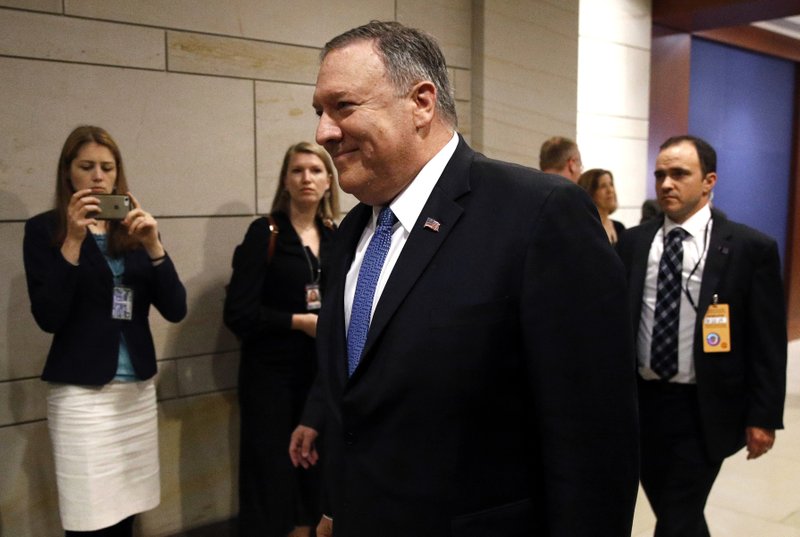WASHINGTON -- President Donald Trump's administration on Friday invoked a rarely used provision in federal law to bypass congressional review of arms sales to Saudi Arabia, citing threats the kingdom faces from Iran.
Secretary of State Mike Pompeo notified Congress of the decision to use an emergency provision in the Arms Export Control Act to move ahead with sales of $7 billion in precision guided munitions, other bombs and ammunition, and aircraft maintenance support to Saudi Arabia, along with the United Arab Emirates and Jordan, without lawmakers' approval.
In his notification, Pompeo said he had made the determination "that an emergency exists which requires the immediate sale" of the weapons "in order to deter further the malign influence of the government of Iran throughout the Middle East region." He said the transfers "must occur as quickly as possible in order to deter further Iranian adventurism in the Gulf and throughout the Middle East."
In his notification, he added that the government had "taken into account political, military, economic, human rights, and arms control considerations."
Pompeo's move follows Trump's announcement that the U.S. plans to send 1,500 additional troops to the Middle East as part of a buildup in response to an unspecified threat from Iran.
It also comes as the administration has actively courted close ties with Saudi Arabia over congressional objections, notably after Saudi agents were accused of killing of Jamal Khashoggi, a U.S.-based columnist for The Washington Post, in October.
Khashoggi's slaying, coupled with increasing concerns about civilian casualties resulting from a Saudi-led coalition's military operation against Iran-backed Houthi rebels in Yemen, prompted lawmakers to block about $2 billion in arms sales to the kingdom for more than a year. Last month, Trump vetoed legislation that would have ended U.S. military assistance for the Saudi-led war in Yemen.
Sen. Robert Menendez of New Jersey, the top Democrat on the Senate Foreign Relations Committee, said the administration did not cite a specific legal or practical reason for using the provision other than Iran.
"I am disappointed, but not surprised, that the Trump administration has failed once again to prioritize our long term national security interests or stand up for human rights, and instead is granting favors to authoritarian countries like Saudi Arabia," Menendez said in a statement.
Sen. Chris Murphy, D-Conn., who earlier this week warned against bypassing Congress, said the administration was only declaring an emergency because lawmakers would have blocked the transfers.
"President Trump is only using this loophole because he knows Congress would disapprove of this sale," Murphy said. "There is no new 'emergency' reason to sell bombs to the Saudis."
The law requires Congress to be notified of potential arms sales, giving the body the opportunity to block the sale. But the law also allows the president to waive that process by declaring an emergency that requires the sale be made "in the national security interests of the United States."
"With this move, the president is destroying the productive and decades-long working relationship on arms sales between the Congress and the executive branch," Menendez said. "The possible consequences of this decision will ultimately threaten the ability of the U.S. defense industry to export arms in a manner that is both expeditious and responsible."
While most Republican lawmakers have stood by Trump, even allies such as South Carolina's Sen. Lindsey Graham have expressed concern about the precedent this sets for overruling Congress. Graham said on Thursday that the Senate has "tools to deal with the administration," but he has not yet indicated what action he and other lawmakers would try to take.
"There's pretty widespread concern that now's not the time to go back to business as usual with Saudi Arabia," Graham said, adding that he voiced his concerns to Pompeo.
The chairman of the Foreign Relations Committee, Republican Sen. Jim Risch of Idaho, said he was "reviewing and analyzing the legal justification for this action and the associated implications."
There is precedent for using the emergency exemption for arms sales to Saudi Arabia. President Ronald Reagan invoked it in the 1980s and both Presidents George H.W. Bush and George W. Bush used it for sales before the 1991 Gulf War and the 2003 Iraq War.
Democrats are hoping that Risch will agree to expedite legislation through the Senate Foreign Relations Committee that could stop the contracts before parts and weapons are sent abroad. Barring that, they may try to use funding measures to block completion of the sales by prohibiting federal funds from being used to transfer the weapons.
Democratic congressional aides pointed to one transaction in particular -- a deal to support manufacturing and production of F-18 combat jets -- as particularly disturbing, as Saudi Arabia does not use the F-18; it only helps make them for countries like Israel, India and South Korea.
Democrats are also questioning whether Trump invoked the proper emergency authority under the Arms Export Control Act, pointing out that deals with NATO countries and allies like Australia are treated as legally distinct from deals with nations like Saudi Arabia, saying Pompeo's letter conflates them.
"The Administration failed to even identify which legal mechanism it thinks it is using, described years of malign Iranian behavior but failed to identify what actually constitutes an emergency today, and critically, failed to explain how these systems, many of which will take years to come online, would immediately benefit either the United States or our allies and thus merit such hasty action," Menendez said, accusing Trump of "destroying" relations between Congress and the executive branch, and jeopardizing the interests of defense contractors.
Information for this article was contributed by Matthew Lee and Susannah George of The Associated Press; by Karoun Demirjian of The Washington Post; and by Daniel Flatley and Nick Wadhams of Bloomberg News.
A Section on 05/25/2019
